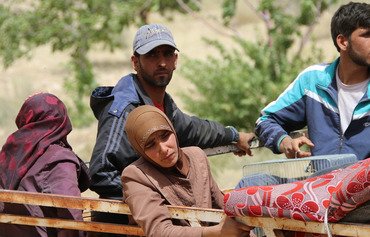Jordan and the international community in February endorsed a $2.4 billion Jordan Response Platform (JRP) for the Syrian Crisis for 2019 to help the kingdom shoulder the burden of hosting more than one million Syrian refugees.
Of this amount, $702.9 million is allocated for Syrian refugees, while $698.9 million is set to support the resilience of host communities and the remaining $998.2 million is assigned for budget support.
Since the reopening of the Jaber-Nassib border crossing, close to 13,000 Syrian refugees have returned to their homeland, according to an estimate provided by the UN High Commissioner for Refugees (UNHCR).
Some refugees who chose to remain in Jordan said they had done so as they were worried about the security situation in Syria and about potential reprisals they might face from the Syrian regime, as supporters of the opposition.
Others spoke about their unwillingness to start over from scratch.
"Our homes are destroyed, our families are scattered, what shall we go back to?" said Abu Ahmad, a Syrian refugee who lives near the University of Yarmouk in Irbid, where his two sons are finishing their studies.
"In a couple of years, both will graduate," he told Al-Mashareq. "I cannot interrupt their lives again."
"We have not thought about what we will do next," he added.
Government-recognised framework
The 2019 plan is the only government-recognised framework within which international grants for the Syria crisis should be provided, said Feda Gharaibeh, director of the Ministry of Planning and International Co-operation's humanitarian relief co-ordination unit.
The plan brings together high-level representatives of the government, development partners, UN agencies and the international community under one planning and co-ordination framework, she told Al-Mashareq.
It ensures "a comprehensive, co-ordinated, [Jordan]-led, and internationally supported response to the multi-faceted challenges faced by the kingdom as a result of the Syria crisis", she added.
The plan covers 12 sectors: education, energy, environment, food security, health, justice, livelihoods, local governance and municipal services, shelter, social protection, transportation and water, sanitation and hygiene.
Its resilience-based approach seeks to respond to and mitigate the effects on refugees and host communities "by integrating humanitarian and development responses into one comprehensive vulnerability assessment", she said.
As the situation in Syria is now shifting, the current JRP has become a one-year plan unlike the previous ones that were designed based on a three-year rolling basis, said Gharaibeh.
Although the international community has been generous in its support, she noted, there was a shortfall in the funding of the 2018 plan, resulting in only two-thirds of the plan's requirements receiving funding (63.9%).
"Support and funding were more directed towards the humanitarian services and refugee needs, rather than a more balanced approach that also funds [governmental services]," Gharaibeh said.
As a result, the quality of services offered by the government, notably in the education and health sectors, have been negatively impacted, she said.
Humanitarian and development needs
"The JRP is the only response framework that can specify the amounts needed for Jordan as a host community," said development expert Zein Soufan.
Soufan was part of the team that developed the first Jordan Response Plan in 2011 at the Ministry of Planning and International Co-operation, where she worked on the livelihoods and social protection components.
"It initially started as a resilience plan, not a response plan," she said, noting that through the years it has "shifted from a purely humanitarian plan to one that integrates local development".
To ensure Jordan's future needs and requirements are met, she said, it is necessary to conduct proper monitoring and evaluation and to work closely with the international community to ensure these are communicated.
Gharaibeh said the plan is prepared in alignment with the objectives and projects of Jordan's Executive Development Plan and its Governorate Development Plan, with no overlap between the various plans.
"It is a stand-alone plan with distinct, crisis-specific objectives, partnerships and financing modalities," she said.
"As for the funding provided by the international community within the framework of the existing JRP, it addresses both humanitarian and development needs of Jordan," Gharaibeh said.

![Officials endorse the Jordan Response Platform for the Syria Crisis 2019 during a February 20th meeting in Amman chaired by Prime Minister Omar al-Razzaz. [Photo courtesy of the Ministry of Planning and International Co-operation]](/cnmi_am/images/2019/03/27/17309-Jordan-Amman-plan-600_384.jpg)






